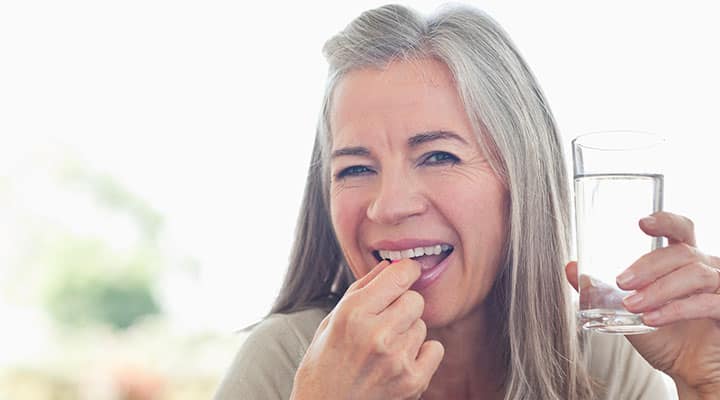
7 CoQ10 Benefits for Women You Should Know About
Published: January 2023 | Updated: April 2025
Coenzyme Q10 (CoQ10) is a nutrient that our bodies naturally produce and is present in every cell. It is essential for cellular energy production. Renowned for its crucial role in maintaining optimal health, coenzyme Q10 may be beneficial for women focused on aging gracefully.
Your body can get some CoQ10 from foods such as meat, fatty fish, cruciferous vegetables, nuts, seeds, legumes and fruits like strawberries and oranges, but dietary sources provide very little CoQ10. So, food shouldn't be your only source. Plus, your body's coenzyme Q10 levels naturally decline as you age, so your body may not make enough of this essential nutrient over time—making CoQ10 supplementation crucial.
Coenzyme Q10 has been extensively researched, and many meta-analysis studies and clinical trials support its broad spectrum of health benefits, including cardiovascular health and healthy aging effects. Research shows that having coenzyme Q10 in your wellness arsenal can help you proactively support overall health at every age. Check with your doctor to see if adding CoQ10 supplements is right for you. In the meantime, let's delve deeper into CoQ10 benefits.
1. Combats general fatigue
There's something comforting about starting your day with a cup of joe, but if you feel the need to drink several cups throughout the day, you might consider taking CoQ10 to help your cells produce energy. Coenzyme Q10 is a cofactor involved in energy production and plays a crucial role in the electron transport chain. It helps with transferring electrons so that your mitochondria, tiny powerhouses in your cells, can make ATP (adenosine triphosphate) from your food.
2. Protection from free radicals
In addition to its electron "taxi" role, CoQ10 helps protect your mitochondria (and cells) from oxidative stress. All cells in your body are vulnerable to molecules known as free radicals. Your body releases these reactive oxygen species during many biological processes, like breaking down food, energy production and even breathing (they also come from external factors). Free radicals generate oxidative stress that impacts your cells and organs, interfering with their regular functioning. As an antioxidant, CoQ10 helps protect against cellular stress.
3. Promotes heart health
Everyone knows the heart has the highest energy requirements of all organs, and this is especially true for women. As your hormone levels change, ushering you into menopause, maintaining overall heart health is imperative. CoQ10 supplementation supports a healthy heart by maintaining the integrity of heart muscle cells and shielding them from oxidative stress (thank you, antioxidant support!).
4. Vascular health support
Another benefit coenzyme Q10 provides to your hard-working pump is blood vessel health support. That's because it helps protect endothelial cells, the delicate inner lining of blood vessels and arteries, against oxidative stress.
5. Encourage healthy circulation
When your heart is on point and the integrity of your endothelial cells is healthy, it sets up the stage for healthy circulation! CoQ10 is an excellent choice to keep your entire cardiovascular system in top-notch health (heart, blood vessels and blood circulation) so your blood reaches all the areas of your body—from head to toe.
6. Help keep your liver healthy
Your liver is another high-energy organ, along with your kidneys and brain. This means it needs a lot of energy (produced by the mitochondria) to do its job—so you'll find coenzyme Q10 concentrated in your liver, aka your filter organ. Your liver works 24/7 to clean and filter out your bloodstream from undesirable compounds that can impact your health. It also helps digest fats, absorb nutrients and is involved in many vital roles in how your body functions. This high energy demand means your liver is susceptible to oxidative stress. A meta-analysis of randomized clinical trials suggests that CoQ10 supplementation can help maintain healthy liver enzyme levels associated with liver health and function.
7. Supports a healthy inflammatory response
Your inflammatory response is part of your immune system and a natural biological response. CoQ10 helps inhibit inflammatory factors to support head-to-toe wellness and whole-body health.
Explore Our Best COQ10 Supplements
How does coenzyme Q10 work in the body?
As we mentioned previously, CoQ10 is a superstar at supporting healthy energy production. However, its benefits go beyond energy support and play several vital roles in your body's natural biological processes. Its broad spectrum of benefits stems from its powerful ability to protect cell membranes from oxidative stress.
It's also a healthy aging support champion. The science of living longer starts with nutrition, which helps your body fight age-related declines in energy production, supporting optimal quality of life as you age. Having sufficient coenzyme Q10 levels as you age is a nutritional must.
How do you know if you need CoQ10?
The best way to know if you need to supplement with CoQ10 is to take a test to measure the coenzyme Q10 levels in your blood. The results will determine the most precise dose to maintain appropriate blood levels of this healthy aging powerhouse. If taking a blood test isn't an instant possibility, you can combat general fatigue by keeping an "energy journal" and supplement with CoQ10 (after you speak with your doctor) for several months; make daily entries in your journal while paying attention to how you feel and how your energy levels change over time.
Pro tip: Because coenzyme Q10 production decreases with age, it is more important to add a CoQ10 dietary supplement to your regimen as you get older.
How much CoQ10 should a woman take?
Your body does not store CoQ10, so continual supplementation is essential to protect and energize your aging cells, especially as your body produces less and less CoQ10 naturally.
CoQ10 supplements come in two forms: ubiquinone and ubiquinol. Ubiquinol is the most abundant form in your body; it is fat-soluble and the most easily absorbed. It is generally more bioavailable than ubiquinone, the other form of CoQ10, which needs to be converted to ubiquinol in the body.
Individuals absorb and utilize CoQ10 differently, so blood testing is the best way to determine the best supplementation level for you. We suggest getting a baseline value, then repeating the test after three months to assess your needs.
Pro tip: Discuss your results with your healthcare provider. They can provide better guidance in finding the best dosing that works for you.
Does CoQ10 Have Any Side Effects?
CoQ10 supplements are generally considered safe and have minimal side effects. Because CoQ10 is present naturally in your body, it is usually well-tolerated. Speak with your doctor before making any changes to your supplement and nutritional routine.
Who should avoid taking CoQ10?
In general, healthy women can add CoQ10 to their wellness journey. It's always a good idea to speak with your doctor before starting a new supplement, especially if you are taking prescription medications.
Note: Although CoQ10 is generally tolerated, its safety during pregnancy and breastfeeding has not been established. If you are already pregnant or are nursing your baby, consult your doctor before taking CoQ10 supplements.
By practicing healthy lifestyle choices like eating nutrient-rich, whole foods, getting regular exercise, prioritizing restful sleep, keeping your stress response in check and adding CoQ10 supplementation, you can harness the powerful benefits of this nutrient and revitalize your energy at the cellular level, so you can conquer every milestone as the warrior woman you are.
References
- Damaneh Soleimani, Mohadeseh, et al. "The Effect of Coenzyme Q10 Supplementation on Liver Enzymes: A Systematic Review and Meta‐Analysis of Randomized Clinical Trials." Food Sci Nutr. September 2023. https://www.ncbi.nlm.nih.gov/pmc/articles/PMC10494615/
- Hernández-Camacho, D. Juan, et al. "Coenzyme Q10 Supplementation in Aging and Disease." Front Physiol. February 5, 2018. https://www.ncbi.nlm.nih.gov/pmc/articles/PMC5807419/
- Stone, L. William, et al. "Biochemistry, Antioxidants." StatPearls. May 1, 2023. https://www.ncbi.nlm.nih.gov/books/NBK541064/
- "Listen to Your Heart: Women and Heart Disease." National Heart, Lung and Blood Institute. https://www.nhlbi.nih.gov/education/heart-truth/listen-to-your-heart
- "Women and Heart Disease." Coronary Heart Disease. National Heart, Lung, and Blood Institute. https://www.nhlbi.nih.gov/health/coronary-heart-disease/women
- "5 Ways to Be Kind to Your Liver." Johns Hopkins Medicine. https://www.hopkinsmedicine.org/health/wellness-and-prevention/5-ways-to-be-kind-to-your-liver
Like what you read?
Please subscribe to get email updates on this blog.











